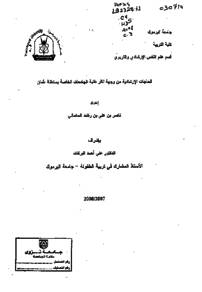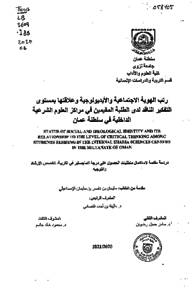Document
نمذجة تأثير الضبط الذاتي في التشوهات المعرفية لدى طلبة مؤسسات التعليم العالي في سلطنة عمان.
Other titles
Modeling the effect of self-control on cognitive distortions among students of higher education institutions in the Sultanate of Oman
Publisher
جامعة السلطان قابوس.
Gregorian
2022
Language
Arabic
Subject
English abstract
The study aims to identify the reality of cognitive distortions and self-control among Omani
university students, in addition to it seeks to identify the differences in cognitive distortions
depending on the university, the cumulative average, and to find modeling the impact of self control and its dimensions on cognitive distortions. The study sample consisted of (1188) male
and female university students in the Sultanate of Oman, during the academic year 2021/2022,
and the sample was chosen by a simple random method. To achieve the objectives of the study,
the questionnaire was used as a tool for data collection, and the descriptive approach was
adopted. The results of the study concluded that cognitive distortions among university
students are at a high level. Accordingly, the arbitrary conclusion came in the first place for
cognitive distortions, then selective abstraction, then all or nothing, then reducing the positives,
then amplification and exaggeration, then personalization, then unfair comparisons, and in the
last place came the excessive generalization. As for the students' self-control level, it was
medium. The results also showed that there were statistically significant differences at (0.05)
in cognitive distortions among students according to the university variable (military, private,
government sector), in terms of arbitrary conclusion, excessive generalization, personalization,
and reducing the positives, and these differences were in favor of the National University
students. of science and technology versus their peers from the Military Technical College and
Sultan Qaboos University. As for the cumulative average variable, these differences were
statistically significant at (0.05) in terms of the ability to self-control, and its dimensions of
general discipline, careful work and work ethic, in favor of students with a low average
compared to students with a high average. The results of the structural equation modeling test
also revealed a good fit of the model with the field data. Therefore, the value of the standard
regression weight was beta (ß=-0.72), and this indicates that there is a strong influence in the
negative direction and is statistically significant at the level (0.01>p) of self-control in
cognitive distortions. The value of the standard regression weight beta (ß) for the five
dimensions came to indicate a statistically significant negative effect at the level (0.01>p), for
each of the following dimensions: general discipline, careful work, and the dimension of
healthy habits (ß=-0.34, -0.39, - 0.45) in cognitive distortions; While there is no statistically
significant effect of the work ethic and credibility dimensions on the cognitive distortions of
university students. Finally, the study recommends the importance of holding workshops to
enhance self-control skills, and to provide students with skills to deal with cognitive
distortions, in addition to raising university students' awareness of the importance of
discovering and diagnosing cognitive distortions of thinking, by holding training workshops
and spreading awareness in social media.
Arabic abstract
تهدف الدراسْة إلى التعرف على واقع التشْوهات المعرفية والضْبط الذاتي لدى طلبة الجامعات العمانية، بالإضافة إلى سعيها في التعرف على الفروق في التشوهات المعرفية تبعا للجامعة، والمعدل التراكمي، وإيجاد نمذجة أثر الضبط الذاتي وأبعاده في التشوهات المعرفية، وتكون عينة الدراسْة من (1188) طالبا وطالبة من الطلبة الجامعيين في سْلطنة عمان، خلال العام الأكاديمي /2021 ،2022 وقد اختيروا بالطريقة العشوائية البسْيطة، ولتحقيق أهداف الدراسْة تم اسْتخدام الاسْتبيان كأداة لجمع البيانات، والمنهج الوصفي.
َوتوصلت الدراسة إلى أن التشْوهات المعرفية لد طلبة الجامعات في مستوى مرتفع، وجاء الاستنتاج الاعتباطي في المرتبة الأولى للتشوهات المعرفية، ومن ثم التجريد الانتقائي، ثم الكل أو لا شيء، ثم تقليل الإيجابيات، ثم التضخيم والتهويل، ثم الشخصنة، ثم المقارنات المجحفة، وفي المرتبة الأخيرة جاء التعميم الزائد.
َوتوصلت الدراسة إلى أن التشْوهات المعرفية لد طلبة الجامعات في مستوى مرتفع، وجاء الاستنتاج الاعتباطي في المرتبة الأولى للتشوهات المعرفية، ومن ثم التجريد الانتقائي، ثم الكل أو لا شيء، ثم تقليل الإيجابيات، ثم التضخيم والتهويل، ثم الشخصنة، ثم المقارنات المجحفة، وفي المرتبة الأخيرة جاء التعميم الزائد.
Member of
Resource URL
Same Subject

